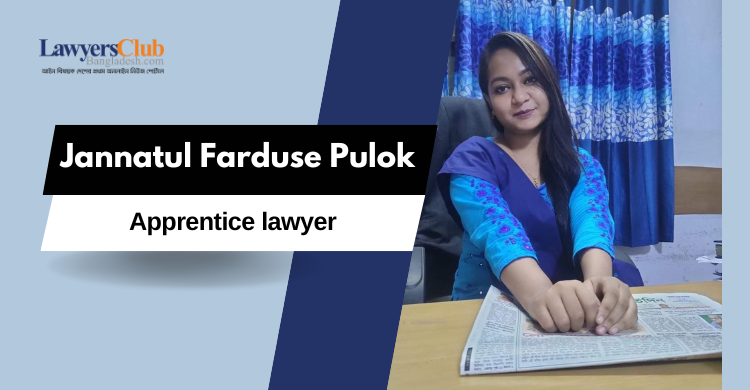The Effects of Parental Pressure on Adults’ Mental Health

Jannatul Farduse Pulok : Parental pressure is a common experience for many children, often rooted in a parent’s desire for their child to succeed. While some level of parental involvement can positively shape an individual’s future, excessive or misguided pressure can have long-lasting effects.
Parental pressure, especially in matters like education, career choices, and marriage, is a significant issue in many societies, including Bangladesh. While parental guidance is an essential part of child-rearing, excessive or coercive pressure can infringe upon the rights and freedoms of individuals, particularly when it escalates into emotional, psychological, or even physical abuse. In Bangladesh, legal frameworks exist that address parental coercion, especially concerning forced marriage and domestic violence. However, the subject of parental pressure is nuanced, and not all forms of pressure may fall within the scope of legal action unless they violate specific laws.
One of the most common effects of parental pressure on adult mental health is heightened anxiety. From an early age, children may learn that their worth is contingent upon meeting specific expectations—whether it’s academic success, career advancement, or maintaining a certain lifestyle. The pressure to succeed, combined with the dread of disappointing their parents, can trigger feelings of inadequacy and self-doubt.
The long-term effects of chronic stress can be debilitating, impacting not only mental health but also physical health. Persistent anxiety has been linked to numerous conditions, including insomnia, cardiovascular problems, and weakened immune systems. Furthermore, when individuals constantly feel they are falling short of parental expectations, they may also experience depression.
Parental pressure often extends to career choices, with many parents steering their children toward professions they deem stable or prestigious. Adults who choose careers to satisfy their parents’ expectations, rather than following their own passions, may experience long-term dissatisfaction and burnout. While career success can bring temporary validation, adults may eventually realize that they are living someone else’s dream, not their own. This can lead to existential crises, where individuals question the meaning and purpose of their lives, often leading to a significant reevaluation of their goals and values.
One of the most significant legal protections in Bangladesh against parental pressure is in the context of marriage. The Child Marriage Restraint Act, 2017 criminalizes child marriages and imposes strict penalties for those who coerce minors into marriage. Under this law, any form of pressure, including parental pressure, to marry a minor is punishable.
Additionally, the Muslim Family Laws Ordinance, 1961, and the Special Marriage Act, 1872, provide protection against forced marriages for adults. If an individual is forced or coerced into a marriage against their will by parental pressure, it can be grounds for annulment or divorce, and legal action may be taken against those involved.
The Domestic Violence (Prevention and Protection) Act, 2010 also provides a broad range of protections against emotional, physical, and economic abuse within the family setting. While the law is primarily designed to protect women from violence within the household, it includes psychological abuse, which can encompass coercive parental pressure in matters like career choices or controlling behavior. This law enables victims to seek protection orders and other forms of legal relief.
The Constitution of Bangladesh guarantees several fundamental rights, including the right to personal liberty, freedom of expression, and freedom of association. If parental pressure infringes upon these rights, particularly when it involves unlawful detention, restrictions on movement, or limitations on an individual’s freedom to pursue education or a career of their choice, the person may have grounds to challenge this through the courts.
There are no specific laws in Bangladesh addressing parental pressure regarding career or educational choices. However, any form of undue pressure or coercion that leads to psychological harm or limits personal freedom could potentially be addressed under broader laws related to mental health or family abuse.
Although mental health laws in Bangladesh, such as the Mental Health Act, 2018, focus primarily on the treatment of mental health conditions, there is increasing recognition of the psychological harm caused by parental pressure. Legal action could be sought if it leads to severe emotional distress or other mental health issues.
If the pressure involves forced marriage, abuse, or coercion that violates legal protections, the individual or a guardian can file a complaint with local authorities. The police or local government bodies can intervene in cases of child marriage, forced marriage, or domestic abuse. In cases of forced marriage, individuals can seek annulment or divorce. The courts can also impose penalties on those who forced or coerced the marriage.
Under the Domestic Violence Act, a victim can apply for a protection order from the court, which can restrict the abusive parent from engaging in further coercion or psychological abuse. If parental pressure leads to psychological harm or violates personal freedoms, individuals can file civil lawsuits seeking compensation or other legal remedies.
While the legal framework exists, taking action against parental pressure in Bangladesh can be challenging due to social norms and the deep-rooted respect for parental authority. Many individuals may be reluctant to seek legal recourse due to fear of social stigma, family breakdown, or personal repercussions. Additionally, the enforcement of these laws, particularly around psychological abuse and coercion, can be difficult because of the subjective nature of the issue.
In Bangladesh, legal remedies are available to individuals facing parental pressure, particularly in cases of forced marriage, domestic violence, or violations of personal liberties. However, taking legal action can be a complex and sensitive process, often requiring the individual to balance familial obligations with personal rights. Awareness and legal reforms continue to evolve, aiming to protect individuals from coercive practices while maintaining the cultural fabric of family relationships.
Author is an Apprentice lawyer (Dhaka Judge court)

